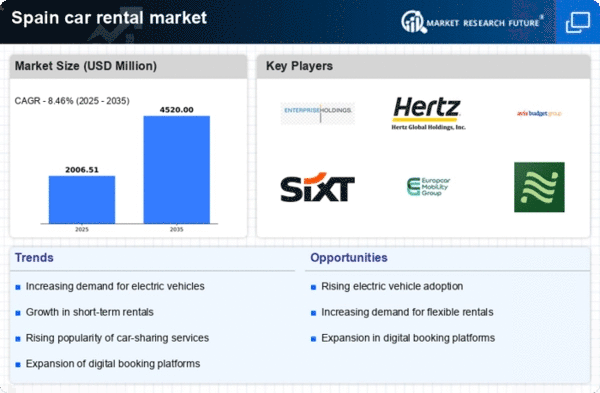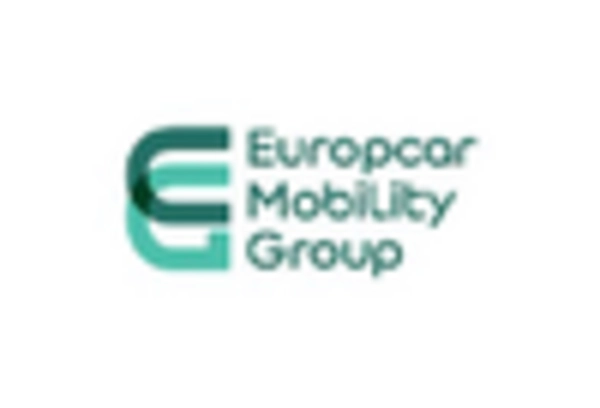Increased Tourism Activity
The car rental market in Spain experiences a notable boost due to the influx of tourists, particularly in regions like Catalonia and Andalusia. In 2025, tourism is projected to contribute approximately €90 billion to the Spanish economy, with a significant portion allocated to transportation services. This surge in travel leads to heightened demand for rental vehicles, as visitors often prefer the convenience of personal transport to explore diverse attractions. The car rental market benefits from this trend, as rental companies expand their fleets to accommodate varying tourist needs, from compact cars to larger vehicles for families. Additionally, partnerships with hotels and travel agencies further enhance visibility and accessibility, making car rentals a preferred choice for many travelers. As tourism continues to thrive, the car rental market is likely to see sustained growth, driven by the desire for mobility and exploration.
Urbanization and Mobility Solutions
Spain's rapid urbanization is reshaping the transportation landscape, leading to increased demand for flexible mobility solutions. As cities like Madrid and Barcelona expand, residents and visitors alike seek convenient transportation options. The car rental market is adapting to this shift by offering short-term rentals and car-sharing services, catering to urban dwellers who may not require a vehicle on a daily basis. In 2025, urban areas are expected to account for over 75% of the population, further driving the need for accessible transportation. This trend indicates a potential shift in consumer preferences towards rental services, as individuals prioritize convenience and cost-effectiveness. Consequently, the car rental market is likely to innovate and diversify its offerings, ensuring alignment with the evolving mobility needs of urban populations.
Economic Recovery and Consumer Spending
The car rental market in Spain is poised to benefit from the ongoing economic recovery, which is expected to bolster consumer spending. As disposable incomes rise, individuals are more likely to invest in travel and leisure activities, leading to increased demand for rental vehicles. In 2025, consumer spending in the travel sector is projected to grow by approximately 5%, indicating a positive outlook for the car rental market. This economic resurgence may encourage rental companies to expand their offerings and enhance customer service, ensuring they meet the evolving needs of a more affluent consumer base. As the economy strengthens, the car rental market is likely to experience a corresponding increase in demand, driven by a renewed interest in travel and exploration.
Regulatory Changes and Environmental Policies
The car rental market in Spain is navigating a landscape shaped by evolving regulatory changes and environmental policies. In response to increasing concerns about climate change, the Spanish government has implemented stricter emissions regulations, encouraging rental companies to transition to greener fleets. By 2025, it is anticipated that at least 30% of rental vehicles will be electric or hybrid, reflecting a broader commitment to sustainability. This shift not only aligns with consumer preferences for eco-friendly options but also positions the car rental market favorably in a competitive landscape. Companies that proactively adapt to these regulations may gain a competitive edge, appealing to environmentally conscious consumers and enhancing their brand reputation.
Technological Advancements in Fleet Management
The car rental market in Spain is increasingly influenced by technological advancements that enhance fleet management and customer experience. Innovations such as telematics and mobile applications streamline operations, allowing companies to monitor vehicle performance and optimize rental processes. In 2025, it is estimated that over 60% of rental companies will adopt advanced fleet management systems, improving efficiency and reducing operational costs. This technological integration not only enhances customer satisfaction through seamless booking and vehicle tracking but also contributes to sustainability efforts by optimizing fuel consumption and reducing emissions. As the industry embraces these advancements, the car rental market is poised for growth, driven by improved service delivery and operational efficiency.
















